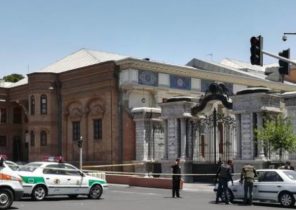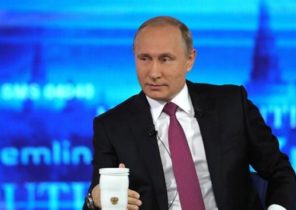
New year is approaching — a time of fun, not reflection, a time for jokes, not cases. And I often ask me, might look like the program of economic reforms. And I often refuse to answer — the topic is too sad. I even say: can’t really speak on this topic. But, in the end, once the New year, because you can talk and not serious.
We all want economic growth. The problem (I’m still seriously), not in our desires, and that our society, our consciousness is not prepared for productive change. An abundance of resources for centuries have enabled us to maintain an archaic economy and political structure, and the terrible events of the twentieth century (chronic hunger to zero, the First world war, revolution and Civil war, red terror, hunger in the 30s, repressions, the Second world war, the repression of the 40’s and 50’s, slow break-up of consciousness stagnation, economic disaster of the late 80s and the mass emigration 90) has destroyed not only millions of citizens, but also the initiative of the society, creativity, civic activity, implemented in the minds of most dependency and primitive-group complex.
We are not ripe for the adoption of change, a catalyst which would be postencephalitic reforms already beaten the whole set of the independence of the courts, the election authorities, the protection of the rights of the primacy of the individual, stimulating economic laws and common liberties. How long have we laughed over Mongolia, which “has made the leap from feudalism to socialism”, and now most of the reformers, theorists rightly complain that Russia is a purely feudal country, but instead to take this into account in their proposals, require the magic of turning it into a country of a developed society, the rule of law and political democracy.
Sociologists can talk about modern Russian schizophrenia: on the one hand, the dream of capitalist democracy that there is no one to implement it, with the other feudal reality that nobody wants to take into account and adjust her economic program. And 20 programs, how to develop our economy if suddenly tomorrow we’ll Wake up and find Russia a modern and democratic (not to mention twenty programs, speaking about how Russia quickly drown in emission, regulation, the new redistribution of property, in the war of the security forces), there is not one, saying what to do if you Wake up tomorrow, we will discover Russia is exactly the same as today.
And here I cease to be serious (PLEASE!), in the head I receive the following: perhaps the correct answer lies on the surface: it is necessary to develop what is, methods that have proven effective in countries like Russia today, for example, in Europe during the early middle Ages, the Golden Horde, the Byzantine Empire.
The patronage system
Let’s start with the main problems of the Russian economy — lack of trust between economic agents and the high level of risks of economic activity, is absolutely inadequate to the expected income. Because of mistrust and fear no one wants to do anything. Earned, stolen, or received in an unsecured loan is removed from the country. The main aspiration of better-educated citizens can enter state service and out one hand to receive a stipend, and other bribes; less educated — to get into law enforcement agencies and from there to Rob more educated. But in the Middle ages, the overall situation was similar: the laws were rudimentary, judges are powerless, who were better armed, and he was right. But the country nevertheless developed.
They have evolved thanks to the patronage of the feudal ladder represented the protection of the economic agents from the very top to the very bottom. Of course, Russia is deprived of a system of estates and feudal hierarchy, and it’s even good, because it opens vertical lifts, but the patronage system we have to introduce quite possible.
Today small, medium and even large businesses suffer from arbitrariness of officials, governors, law enforcers and Central authorities. The system of patronage would eliminate the arbitrariness by replacing it with a strictly regulated relationships. Patronage could be a licensed business. The license would be received by organizations that have developed their legal departments, security departments, sufficient capital, being able to prove its strong connection with the higher power and the ability to influence the decisions of the judiciary.
The administration of the President could perform the role of “protector of the protectors” and would give patronage by licensed protectors against each other. Successful protectors could be, for example, Sberbank, the Russian Orthodox Church, VTB, “Russian Post”, a group of Bank “Russia”, Russian Railways, Gazprom, Transneft, Russian technologies, RUSNANO, VEB, RDIF, and a number of other organizations. It is very important that protectors do to protect customers, so their number should be limited in the regions they have to operate through their branches.
With protectors of their clients would be divided and a share in the business and some of the profits. The maximum tariffs for protection would regulate the state. The protectors were going stakes customers that could be merged into the funds, and the funds, for example, listingwith on the stock exchange — it would encourage stock market. Company, without protectors in General one would not listingwith — what they are without protection.
Would, of course, some conditions. For example, the protectors would not be eligible to participate in the competition to their customers. Their task was only to protect the business from encroachment of bureaucracy in all its forms — governmental, judicial, control, power. On the other hand, the protectors would carry the responsibility for clients in fulfillment of their latest commitments and ethical business behavior, which significantly increased the confidence between the businessmen. Finally, the protectors could be liable together with the client, if the latter was accused of the crime. This would ensure close monitoring of clients with hand protectors.
The patronage system would solve the issue of business protection from the encroachments of bureaucracy and the problem of mutual distrust in a business environment. The competition between the protectors brought to market relations with them, with transparent pricing. That would be the key to valid cost-of patronage for the development of business and, more importantly, the predictability that is so important for business.
Magdeburg-Tver right
Along with the patronage system (which is good for traditional businesses, but not conducive to the development of new technologies, inventions and knowledge-intensive business) would do well to adopt the medieval system of the local the introduction of a progressive law in some cities where they can form clusters of the new economy. If in Europe, it was the Magdeburg law, in Russia it may be, for example, Tversky right — a special set of laws created by the transfer in Tver fundamental laws of, say, German business law in Russian language.
The city that receives such a right, are analogues of special economic zones, only the essence of these zones will not be in external subsidies or reduced taxes (as will be shown later, the system will reduce taxes everywhere), and in creating opportunities for establishment of effective economic relations. The cities should elect its own leadership (magistrate) from among the residents themselves make the laws on residence (to take the number of the citizens of the city by its rules), to establish local taxes and to amend and Supplement the laws regulating the operation of commercial enterprises and social life (including criminal code) on their site, they choose your court and the leadership of the security bodies themselves form social security of its citizens, and self-regulating professional organization should have very broad powers.
It is wise to limit the number of such free cities a couple of dozen, and the number of the inhabitants of, say, 15 per cent of the total population of the country. These figures roughly correspond to the level of readiness of Russian society to such economic relations. You can even reasonable to limit the travel of the residents of such cities in the other regions of Russia (but certainly not abroad) and arrival of residents of the rest of Russia in these cities. There is a high probability that within such cities will focus not only applied science, education, modern culture and production, but also protest groups that will allow partly to satisfy these groups and to reduce the level of protest and, in addition, effectively isolate them from the rest of society.
Tax system and budget
Of course, by itself, the system of protection and care to the free cities modern businesses can have negative consequences for the budget — protectors effectively protect the business, not only from the exactions of the tax authorities, but also from the excessive tax burden, and the free cities would pay less taxes to the Federal Treasury (except for the fee for the right of residence in the free city, which could be substantial). Therefore, when implementing these principles required the balancing mechanisms.
Moreover, the construction of the system of patronage will take time, and after building it, the effect will be shown immediately. New investment will come gradually, it will take years to turned into jobs and products. To solve the problem of the transition period and reducing tax payments caused by the protection, due to the simultaneous radical changes in the tax system, changes in the spending priorities of budgets and implementation effectively work in medieval Europe system of tax-farming.
Off
Pay off (of course, with licensed farmers) will allow to solve several important problems. First, the state will have the opportunity to consistently plan costs and will be able to create additional reserves as payment for the mercy will be made ahead for a period from one year to several years (possible even the sale of “forever”, up to 49 years). Second, the sale of farm taxes on a tender basis will maximize the revenue of the state tax farmers would compete for mandates. Thirdly, the system of farming will translate now which is a great burden on the state budget of the personnel and the infrastructure of the tax authorities in the discharge structures of the market, besides paying taxes, it will significantly reduce the burden on state budgets, and the tax-farmers, in an effort to save money, significantly optimize the budgets of these organizations.
Fourthly, the farming activities will be engaged and protectors, and other structures from among particularly close to the first persons of the state (the farming business is very profitable). This will allow to legalize their right to a windfall, and, instead of being a burden for the budget and continually plunder allocated to special projects funds, “friends of the first individuals” will be motivated to maximize the revenues of the budget (as one of the conditions of the repurchase can sell the right to repurchase for a fixed amount, and then all assembled beyond it, to divide in certain proportions between the farmer and the budget).
The mercy will be to securitize, and the financial market of Russia will be a whole segment with a market capitalization in the tens if not hundreds of billions of dollars, with their derivatives, hedging, private market debt secured by mercy, and so on. This will give huge opportunities for pension funds, banks, foreign investors, revive the financial system.
Finally, the tax farmers will create a reasonable market balance protectors in corporate taxes (and if you will introduce the concept of personal patronage, and in the area of taxes on individuals) — it is clear that Sberbank is more reasonable to agree on the amount of taxes from your client, for example, with the structure of Rothenberg than the client with the tax inspector.
Changes in taxes
In parallel, it is necessary to significantly change the tax system itself. Today the income tax and tax on profit of organizations make up perhaps 10% of the revenues of budgets of the Russian Federation (20%), collecting them is extremely time-consuming, the level of evasion is high. It is useful to recall that in medieval Europe there was no individual income tax, and the counterparts of income tax was similar or imputed (contract) taxes, or by voluntary donations. It is possible to cancel both the tax in Russia.
A replacement income could be increased legkoobratimy taxes on property and land. To compensate for the income tax, they should increase about three times. This would also solve the problem of progressivity, provide a sense of social justice and will give preference to domestic landowners and builders — unlike the foreigners they will not pay income tax.
Replacing the income tax could be imposed a tax on final sales (paid by customers who purchase goods or services for use and not for resale), which would replace, in some cases, difficult calculated VAT. If you save the VAT only on imports in the same size as now, and internal operations to impose a tax on final sales, the budget will not be affected, the administration and calculation of taxes will become much simpler, economic agents will be motivated to save (and therefore invest), to create a business and reinvest the profit.
In today’s Russia is a widespread practice of unreasonable demands tax payments, which taxpayers, realizing the futility of litigation, often pay taxes or agree with officials about replacing the payment of assessed taxes by the payment of bribes. This practice partially have to beat the system of payoffs, but we can assume that in the framework of the farming system, and under protection will still meet the attempts to withdraw excess taxes. The state will receive by the time such a dispute the monies owed and will be interested only in the continuation of the work of the payer.
So it is necessary to Supplement right and even tax collectors (tax farmers) and payers (perimeter protectors) to agree on the size of the taxes paid out on the amounts that can be calculated on the basis of legislation. This will give both that and another greater flexibility to adjust payments under the current market situation, will protect companies and citizens from too high payments in times of hardship and will remove a significant burden from the courts dealing with tax disputes.
Budget cuts
Of course, it is necessary to critically approach the question of the size of the budgets and decide what to Fund, what not and what we should give opportunities for self-financing. Conventionally, the Russian budget can be divided into seven major parts, each of which will be its fate and its methods of reduction and compensation of this reduction. Very sketchy plan for the restructuring of the budget following.
The maintenance of the army
It is obvious that the generals are a dangerous group, in whose hands are possible up to destabilize the country and change of government, so the question of reducing the total funding of this group can not go. However, it is possible to significantly change the system, giving the army and the defense industry new, extra-budgetary sources of financing.
In particular, it is possible to secure the rights of senior officers to make decisions about commercial use of army units outside the country. In the end, private armies exist and get more revenues, and Russia could and here go the way of the medieval monarchies and to sell the services of his army — the demand for it no doubt. I am sure that even the NATO countries with pleasure would pay for the decision by the Russian army for their tasks. Soldiers would not only bring huge returns to their country, but also to solve some geopolitical objectives, and constantly test and promote new weapons.
In addition, the army in the face of any of their institutions could obtain a license of the protector and to use it effectively. The transformation of the army into a professional was needed not by the abolition of conscription, and conversion in military service with the rejection of all forms of deferments and exemptions, except the exemption for health: the life span should be increased to 4-5 years, to establish a service for women (shorter, say, 18 months or two years).
The most important element of this service that few people would like to work out, there is a solution to pay with money instead of service. The ransom amount needs to be substantial, but bearable; rather, it can be set on a market basis, by auctioning off, say, 300 thousand “panel units” per year (most likely, the demand will be even higher). To maximize revenue you can sell multiple levels “shield”: the complete liberation; the reduction of the term (monthly sales); the opportunity to serve in a comfortable units, close to home, returning home for the weekend; the opportunity to serve in the civilian personnel living at home, and so on. A rough calculation shows that “shield” can give at least 10-20% of the “defense budget” (of course, it will be necessary to credit the payment panel and create a Agency offering installment payment, the interest income will add to the revenue of the army).
Parallel to the increase period and the involvement of girls in the army not only partially solve the problem of unemployment among youth from poor sectors of society, but also increase the possibility of extracting the army business income. In particular, it is possible to return to the practice of military settlements, where the settlers will be engaged in agricultural activities; of the recruits will form a special military construction company involved in civil economy; the Ministry of defence will have to be security licensed and actively selling security services and so on.
The contents of the FSB and MVD
In the same way as the army, the security structure can be extremely dangerous from the point of view of the stability of the government. Officers are for the second number (after the military) number of coups and are the only force capable of these coups to prevent. To cut their funding would be unwise. But here, it is possible to develop a number of measures on the direct replenishment of the budget of these organizations.
You can start with the use of the natural desire of wealthier part of the population to information and freedom of communication. Given the risk that potentially pose to the stability of the freedom of speech and uncontrolled functioning of the media, but also taking into account that direct censorship is archaic, inefficient and contrary to the natural liberties Institute, you might think about the introduction of paid licenses for free access to information (e.g. access to foreign sites to receive foreign publications, for reading the uncensored print and online editions produced in Russia) and paid the licensing of the media, bloggers and authors who want to work without censorship.
In Russia it will be typed not less than 10 million people who will be willing to buy the license for the free information (it is possible to take with them a little — about 1000 rubles a month, it will already give 12 billion rubles). We don’t know whether the media that wish to be “free” to pay, for example, 10 million rubles a month each, and it is not important; will be able — so the budget will be replenished (and the media will be free to attract advertising, as advertisers will not be afraid of them closing); and fail — there will be nobody to encroach on stability in society.
Moreover, following the principle of “freedom is expensive”, and given the fact that any freedom represent for society the danger, the opposition which the forces of law enforcement agencies is money, you need to charge significant fees for granting citizens certain freedoms, simultaneously making a list of such liberties by the largest possible.
Pay should be the freedom to move around the country (annual license for free travel), freedom of shift work (one-time fee), freedom of refusal from employment (monthly payments), the right to be on the street at night (annual license), the right to keep and bear arms (monthly payments, types of weapons is not limited to) the right to travel abroad (one-off charges in the amount of 100% of the cost of tickets), the right to store money and purchase values abroad (fee 10% amount) the right to hold meetings and rallies (charge 100-200 $ per one person, if the meeting is in a public place, and 10-20 dollars — if in a private space; a meeting should be considered as meeting more than ten people, if not all of them are relatives), the right to switch off the state television (normal TV should work 16 hours a day on one of the state channels, with reluctance I have to pay a daily fee) and other rights.
In addition, you can create a system of paid privileges, for example, for a few thousand dollars a year you can give the car a payer’s preferential status on the road (for input green flashing lights). The system of toll privileges can form within the society a group of new aristocracy. The payment of the privilege will make the new aristocrats of the major sponsors of the budget, and hence useful to society stratum, it will need to reconcile the society with some infringement of his rights in favor of the group. Conditional fee aristocracy would be on the next level.
The third digit. 10 thousand dollars a year. Approximately 1 million people. Eligible for all services, including private, out of turn, but yielding aristocrats of higher rank. The right of disobedience to the linear law-enforcement and security officers, the right of access to institutions and public places without examination and invitations. Greatly shortened the list of grounds for detention. The right to demand from the aristocracy to give way and to run errands. The right verbal abuse, destruction of low value property and beatings without injury do not belong to the aristocracy. The right to demand the replacement of officials in local authorities (up to the mayor of the city) in a joint statement a hundred aristocrats of the third category.
The second discharge. 100 thousand dollars a year. About 10 thousand people. The same as that of the third digit, plus the lack of jurisdiction of the courts of General jurisdiction without the sanction of the noble Assembly. Immunity — law enforcement officers will have no right of detention, apart from a very narrow list of situations. The right application of light bodily injuries and damage to valuable property not belonging to the aristocracy. The inclusion of the right does not belong to the aristocracy of the citizen to the blacklist (defeat many rights) personal statement. The right to demand the replacement of officials in local authorities (up to the mayor of the city) in a joint statement, the ten aristocrats second level and right up to the Governor in a joint statement a hundred aristocrats of the second category.
The first discharge. $ 1 million per year. About a thousand people. The same as that of the second category, plus the jurisdiction of the Supreme court and only with the permission of the noble Assembly; full protection from prosecution by foreign courts, the plaintiffs and other spillage on the territory of Russia and protection capabilities outside the territory of Russia regardless of the nature of the charges. The right to demand special respect from paristokyo, including the bows at the meeting. Right grievous bodily harm do not belong to the aristocracy. The inclusion of the right does not belong to the aristocracy of the citizen and the aristocrat of the third category in the blacklist (defeat many rights) personal statement. The right to demand the replacement of officials in local authorities (up to the mayor) personal statement and up to the Governor in a joint statement, the ten aristocrats of the first rank. The right presence at receptions and events at the highest level. A collective right audience with the President during an aristocratic audiences four times a year. The right to submit petitions and requests to the President and to expect extraordinary consideration, the right to request or petition personally, not more than once in two years.
Privileges should be extended to immediate family members (free at his wife, and parents and children — 10% of the cost).
The proceeds should in part be used to Finance the system FSB. Funds received in the form of aristocratic payments (roughly 15-17 billion a year), should reasonably be shared between the various budget lines.
An important source of income could be the change in the system of criminal prosecution and execution of punishment. It is necessary to introduce the widespread use of the punishment in the form of long-term correctional labor (completely replacing this type of punishment is imprisonment for minor, non-violent over the individual articles). Corrective work shall take place on the enterprises and organizations that apply the labour of convicts, with a list of remuneration in full in the budget of the FSB, the interior Ministry, or even in place of current work of the convicted person or another location, by mutual consent of the employer if the court will give such permission (the court must be guided by the principle of maximizing deductions).
The system itself is the FSB, the interior Ministry may in itself create a network of production structures (construction companies and troops, factories producing simple production not requiring highly skilled workers, logistics centres, utilities and enterprises that use skilled labor in the field, who have a consistently sufficient number of prisoners — for example, avtokombinate or companies that outsource accounting services). In this situation, and even profits will be available to the system. Since the degree of personal freedom of the convicted employees of such enterprises will be much higher than in institutions in GUIN, and they will work on their specialty, the level of income of their employers would be orders of magnitude higher than today colonies from the labor of prisoners.
Of course, it is necessary to expand the list of violations punishable by correctional labor (to include repeated administrative violations; for example, the third year for traffic violations — corrective work for three months; driving while intoxicated — three years), and the timing of such works to make a significant, no less, and often more current. Thanks to this system will have at its disposal a minimum wage simultaneously from 500-700 thousand people less their minimum content, i.e. about 25 billion rubles a month, 300 billion rubles a year from the current 1.5 trillion rubles allocated to the system as a whole. If we impose a punishment of correctional labor for failing to repay their loans (with half of the earnings will go to the creditor and half to the budget of law enforcement), the amount may increase by another 25-30%.
Another change in the law should apply to the possibility of redemption for the crimes committed and the commercialization of detention. This system in a perverted and awkward shape operates in the developed countries in the form of bail, but where the defendant does not want to serve his sentence, is forced to flee as collateral is not an excuse. In Russia you can enter terms of payment, exempting from liability; exception should be only the most dangerous crimes — murder and grievous bodily harm, sexual crimes against minors (and that is an issue that requires discussion). Payments must be very high, the responsibility for the crimes did not look too low. Of course, the payments will not replace compensation for the damage, as it will not go to the victims and to the state.
In Russia for a year there are more than 800 thousands of persons who have committed crimes of small and average weight. If only 5% of them will resort to ransom in order to avoid punishment (will sell property and cars, to take long-term loans to purchase, etc., and the average repurchase price will be $100 thousand), the law enforcement system will get another 280 billion rubles a year. It is also impossible to ignore the reduction in the number of prisoners in the application of redemption and remedial works — this reduction would reduce the cost of the prison system. And in General to reduce to almost zero the costs of the jail, prisons and camps, you can create a class hierarchy of detention: free content under the terms will not differ from the present, but for a fee you can get the hotel conditions of different level and additional rights (from food delivery from any restaurant unlimited access to relatives and friends, additional living space). You can also on a commercial basis to replace pre-trial detention in house arrest.
Separately it is necessary to modify the legislation on compensation. First, it is necessary to introduce financial responsibility of relatives to damages caused by the convict. This will not only reduce the level of crime (relatives will look out for each other), but would significantly increase compensation payments, including in cases where the injurious person, to protect his assets, converts them to family members. It is also necessary to introduce the concept of moral damage to the society and to prescribe the procedure for determining the amounts of compensation which will go to the state. Under causing moral damage to society will get a wide range of acts, from crimes that have a negative resonance and thereby affected the feelings of the society, to the public acts, causing adverse effects.
It is also desirable to introduce a law on compulsory outsourcing of security services for enterprises, and the Ministry of the interior of the FSB to create a centralized network of agencies on the safety (but not security, it is the prerogative of the Ministry of defense, and the analogue of the Soviet first division). All legal entities in the country could be required to pay the local Agency-the branch of remuneration for the provision of security. In Russia today, 4.1 million of legal entities, more than 60 million workers. Even the payment of 1,000 rubles per employee per month will provide at least 720 billion per year; however, because the company will be relieved of the need to have their security, their spending will not grow.
Infrastructure spending
Due to the improved risk situation of the business through the introduction of a system of protection, the principle of reducing taxes on income and the establishment of zones of Tver rights the state will be able to drastically reduce infrastructure costs, in large part enabling the business to engage in its creation and/or attraction of foreign investors. However, even in these conditions, government spending on infrastructure will remain strong. They can be cut due to the introduction of permission crossing Russia to taxes and the state labor service.
The GTR should refer to all adult citizens without disabilities, except those on maternity leave working in positions exempted from the GTR in detention or on community service. GTR should be working out 1/12 part of the working days (total 20 working days in a year) on infrastructure projects of the state or pay the state a monthly standard maintenance of infrastructure employee of the company (determined annually). At the time of the GTR, the employer would continue to pay the employee’s salary. To compensate the employer’s loss can reduction provide mandatory paid leave up to 14 working days per year and a reduction in the number established by the state for weekends and holidays from 119 to 113 in the year.
Travel guide to apply may apply on all vehicles, for example through a fixed tax on the purchase of fuel by end users. Such a tax would adequately reflect the investment in the development of the road network — the more roads, the more fuel they will burn consumers. Where the increase in the tax stop, you can stop the growth of investments in the road network.
Sources of enrichment for the privileged persons
The existing system in Russia rests on a loyal multi-level hierarchy of officials who, almost like the feudal lords in the Middle ages, control of loyalty and obedience for their assigned geographic, professional and social areas, as well as mutual control. Of course, the bureaucratic elite and the inner circle of the rulers must have a constant source of very high income in order to remain loyal and to perform their functions.
The number of privileged citizens can be very roughly estimated at 20 thousand people (corresponding to about half of the so-called top officials in Russia), divided into 10 levels, with a total required revenue of nearly 2.25 trillion rubles a year (if you count that one person at the first level gets $500 million a year, and on the tenth — 10 thousand people getting $500 thousand per year).
This figure (about 15% of the Federal budget) seem great, but in practice it only two annual net profit of “Gazprom”. The most effective way of forming a pool of remuneration of privileged persons seems to be the creation of a feeding system through large state-owned enterprises (if such enterprises will be missed, it is possible to nationalize a number of companies, such as those related to natural resources). Fifty percent of the profits of these enterprises could be sent directly to compensate for these 20 thousand officials. In addition to providing compensation, such a mechanism would ensure the direct involvement of officials in improving the performance of enterprises involved in feeding, which undoubtedly would have an impact on their effectiveness.
Medical and pensions of the population
Social security of the population is a significant problem for the modern state — even with the very high rates of social charges Russia can not reduce the budget of the social and pension funds, much less a profit, at least without massive infusions directly from the state budget. In the near future in connection with the reduction of the workforce and the ageing of the population and the social system is threatened with bankruptcy.
The only way out of this situation is the radical change in the approach to social security. This requires, as in the situation with the financial responsibility to enter into legal practice the concept of “relative” and “family” as a set of relatives. Today the relationship is asymmetrical — the relatives are entitled to inheritance, but not the obligation to take care of each other (with the exception of child care). It is necessary to entrust the care of pensioners, disabled and ill on the shoulders of the relatives, to prescribe by law the extent to which relatives are obliged to Finance the costs of socially protected citizens, and minimum size of such financing.
The government may once a year to determine the demographic ratio of socially protected citizens and able-bodied people, setting the amount of benefits that every able-bodied citizen will have to make to social security. Able-bodied citizens with socially vulnerable families will transfer the funds directly to them and report on expenditures at the state office (and their relatives will take the report on the receipt of funds, compliance reports will be checked). Those who have no relatives or protect the amount of required funding for their less-than-normal allocations this year, or will find their own wards and sign with them a one-year contract social protection (and to hand over two reports), or to pay the difference to the state, and it already will use these funds to social security of single socially protected, that nobody took care of.
A mandatory part of this policy is to encourage marriage and procreation and discrimination of single and childless people of working age (they are potential lonely elderly and disabled persons that have to take care of the state). It will be necessary to introduce a substantial tax on childlessness levied ranging from 20-25 years, three times with no children, double the size if one and single if there are two children. Funds from this tax will be accumulated in the social security system and subsequently allow the government to protect lone citizen when he will grow old, get sick or become disabled.
Naturally, in such a system there is no place free medical care. All medical support will have to go to insurance or a purely commercial basis. In addition, for insurance single non-working or low-income citizens will be legislation to limit insurance rates — insurance companies will consider these benefits through the increase of tariffs for ordinary citizens. Medical insurance will also need to make it compulsory, and the subject of insurance to bring a family in the legal sense of the word, to the elderly and children are automatically insured together with the able-bodied family members. The entire medical system needs to move to self-sufficiency.
Expenditure on education, science, culture
Although in Russia the social value of education, science and culture is not as big as in developed countries, however, it is still necessary to maintain a certain level of professional knowledge and technology development, at least in order to be able to maintain the country’s defense, the work of export-oriented industries and to ensure a decent level of equipment and real estate used by the elite. Moreover, education and culture are the agents of the ideology, channels, consolidation of society and a critical element for the creation of the proper social consciousness. However, in this area the expenses of the state, it is possible to reduce extremely.
First, it is necessary to conduct a quantitative audit of the education system. This year’s free 11-year-old program for most of the population can be reduced to four primary classes by making continuing education paid for all but a small group of the most able students, abolishing compulsory secondary education. You can save the free military education under the condition of further service in the army — it will strengthen the officer corps due to the influx of those wishing to receive an education.
Higher education is also necessary to make a fee, with the possibility of providing state education loan, with payment due to the work of state institutions for distribution for a minimum of 10 years.
You can also change the status of the entire system of education and culture by passing the control of the Corporation, who will be happy to use them for self promotion, — the Russian Orthodox Church (in some regions — the Central spiritual administration of Muslims). ROC will be ready to attract and invest in the education of a lot of money subject to obtaining such influence in society, which will lead to an increase in the number of parishioners and, accordingly, growth of the income of the Church. Other denominations will be ready to follow the example of the Russian Orthodox Church on a limited scale.
This idea may seem risky, but it is worth remembering that in the Middle ages in Europe, universities were founded and existed for a long time is due to the Church, or rather, the necessity of training a large number of educated priests. In modern Russian conditions the Russian Orthodox Church will be able in parallel with corresponding changes in training programs significantly increase the volume of financing of scientific, cultural and educational institutions and at the same time to solve the issue of proper education of students.
The Church you can also outsource monitoring and management of civil status registry offices, archives, and more. A return to the practice of Church marriage, birth and burial will allow the state to remove this feature.
Finally, education is an asset, the property, equivalent to its financial core real estate or tools. Therefore, it is logical to introduce a tax on education: to levy a large tax on those who have a degree, and less with those who have higher education.
Such a change in the financing structure of different parts of the budget will reduce budget expenditures by at least 2-2. 5 times. The remaining part will be easy to Finance solely by revenues from natural resources, even if the price was lower than it is today.
In General, this program addresses key challenges facing Russia. First, it protects the existing elite and reinforces the status quo. Second, opportunities for economic development and attracting capital into the country. Thirdly, creates the conditions for entrepreneurial development and the apparent mechanism of motivation — the possibility of entering the aristocracy is to spur activity. Fourthly, making Russia through the mechanism of commercialisation of army — friend of all the rich countries of the world and part of the global management of the planet. And finally turns all the shortcomings and ulcers of the Russian society in dignity and as an integral part of progress. Or I do something wrong?







